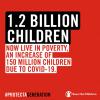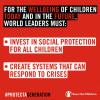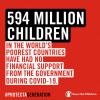A Foundation to End Child Poverty
The global economic shock brought about by COVID-19 could set back over a decade of progress in reducing child poverty and severely undermining progress made towards achieving the Sustainable Development Goals and children’s rights as set out in the Convention on the Rights of the Child. Analysis jointly carried out by Save the Children and UNICEF estimates that approximately 150 million additional children are living in multidimensional poverty due to the COVID-19 pandemic.
With the new report, A Foundation to End Child Poverty – How universal child benefits can build a fairer, more inclusive and resilient future, Save the Children is calling for urgent action to address soaring child poverty through providing regular financial support to all children. Governments, donors and development partners need to work together for an expansion in social protection coverage of children and their caregivers, working progressively towards Universal Child Benefits.
In response to the COVID-19 pandemic, nearly all countries announced social protection measures. Still at least 594 million children in low-and-middle income countries have completely missed out on much needed child and family-specific economic support to protect them during the COVID-19 pandemic.
The deprivations that millions of children are suffering not only risks their lives today and tomorrow, but also undermines productivity, economic growth, and social cohesion in societies. Increasing poverty deeply affects children and even short periods of deprivation can have life-changing impacts on children’s health, development and life chances.
With increasing poverty, the number of children under five suffering from acute malnutrition could surge by 7 million by the end of a year, representing a 14% increase. By the end of the year, half a million more girls are at risk of child marriage and 2.5 million over the next five years. This is in addition to the 12 million who marry each year. Increased poverty could also lead to between 7.0 and 9.7 million more children dropping out of school.
Child benefits are needed in the fight against child poverty, and to help families to mitigate the impacts of crises. This would ensure basic income security for all children in line with the Sustainable Development Goal Target 1.3, which aims to establish social protection floors in all countries by 2030. Child benefit systems can also help manage future shocks - building much needed resilience.
Universal Child Benefits provide a crucial investment in children and in our future. These benefits can help reduce child mortality, chronic malnutrition, improve educational outcomes and access to school and reduce various forms of harm to children. Countries investing in children now will also reap long-term rewards from a more skilled and healthier workforce in the future.
Child or family benefits have proven to have also significant economic multiplier effects in local economies. Investments in family income go beyond supporting families in need, and contribute to the local economy, a much-needed measure at this time. At a time when many countries are struggling with recession, job losses and rising poverty and debt, it is important to consider which investment options will provide both immediate and long-term benefits. We believe universal child benefits fall squarely into that category – with strong and well-evidenced economic and social benefits that provide multiplier effects when combined with other investments (in education and health for example).
This report is a call to action to Donors, states and developmental partners:
1. Prioritise investment in children by creating more fiscal space for child-focused social protection, aiming towards at least 1% of their country’s economic output (GDP).
Donors and development partners should do more to ensure temporary financing measures are in place, for example through increased aid, debt relief or a global fund for social protection.
2. Aim to move towards universal coverage - Donors and developmental partners shall support governments in providing coverage for all children, particularly in their early years. This will give children a safe and healthy start in life, building human capital along the way. Vulnerable groups and the most deprived and marginalised children, such as those with disabilities, will need special attention.
3. Ensure that child benefit systems and programmes are responsive to shocks so social protection systems can quickly adapt and respond in the event of future crises including climate change, providing financial protection for vulnerable families.
To see the full report, please, see the bottom of this page




 Georgia
Georgia